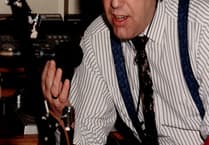DESPITE being unable to sing, play an instrument or read notes and, further more, being leaden footed with a total lack of rhythm, music has always been important to me; as I grow older, it becomes ever more so.
Back-along, during the long tedious and disturbing period of lockdown and restrictions due to coronavirus, I found the playing of CD’s both restful and calming to the nerves. Not pop, mind you – not of recent times anyway; there has not been a group greatly to my taste since The Beatles or a single performer I would pay to watch since Roy Orbison. Mind you I do enjoy listening to the sparkling rag-time of the great Scott Joplin.
However, at present, the melodies I listen to are often provided by that fine violinist and conductor, Andre Rieu, with the mellifluous backing of his highly professional orchestra. Assuredly he plays the type of music I enjoy; some well known opera arias are often featured and, even more to my liking are Viennese waltzes; also the compositions of Mozart and Handel can delight the senses.
That which appeals to me most though are usually melodies from ‘musicals’, most of them post-war, with the majority, it must be conceded – American. The attraction to me of such is not only that the refrains, generally, are pleasing to the ear, but, also, most are vocal; I feel on the whole that a song is enhanced if the lyrics be clearly enunciated and tell a story.
These music and song based ‘plays’ almost invariably start off as stage shows and end up as films. As a serial cinema attendee in my younger days, I rarely missed the colourful, spectacular Hollywood musicals of the era, which showcased the works of Rodgers and Hart – which morphed into Rodgers and Hammerstein – Lerner and Lowe, Leonard Bernstein, Stephen Sondheim plus gifted British composers such as Lionel Bart and Andrew Lloyd Webber. The themes of these productions covered manifold subjects, but at the core of the majority is ‘love’, and this emotive arena of attraction, rejection, deception and desire produced many memorable numbers.
Some of these are cynical observations of man’s often bizarre, almost irrational, behaviour in pursuit of the woman of their dreams, summed up in the line – “but the guy’s only doing it for some doll,” from the song ‘Guys and Dolls’ in the pulsating show of similar name.
More are featured in that sublime creation, ‘South Pacific’; we have a chorus of lonely sailors stating plainly, and loudly, “there is nothin’ like a dame.” Also, a young soldier, to the girl of his dreams, declaims, “younger than springtime are you,” whilst a nurse, feeling betrayed, intends to have a shower to “wash that man right out of my hair.”
Not all ladies, however, are so disillusioned with the males in their lives – and their hearts. The heroine in Carousel lavishes praise on the man she loves, yet she has no misconceptions; “just my Bill, an ordinary guy,” warbles she. Unspectacular and unremarkable though he might be, she still views him as the partner with whom she wishes to share her life. This has to offer both solace and encouragement to many a fellow who does not overly fancy his chances of wooing the lady who has stolen his heart.
Similar sentiments are echoed by Mary Wells in her chart topping single of some years back – ‘My guy’. Nowhere does she eulogise him or depict him as being a gentleman of major achievement, but she loves him – simple as that. Then there is the haunting track from Bart’s fabulous musical ‘Oliver’ – Nancy singing, “As long as he needs me.” Under the spotlight of all that is logical and right, this ill-used heroine’s loyalty to the vicious, abusive Bill Sykes is almost beyond comprehension. Whatever, her reward was to be murdered by her brutal lover. Whilst this, of course, is fiction, often such is reality in a world in which domestic violence – and, so often, homicide – is all too common.
There are too ditties which, though humorous, articulate disputes which can fracture families – certainly in matters of the heart. The epic ‘croonfest’ that is the film ‘White Christmas’ has a memorable track along such lines. It concerns female siblings, “God help the mister who comes between me and my sister – and God help the sister who comes between me and my man.”
Then there is the optimistic – indeed positive – expectation of a fellow when considering his future love life. In that rumbustious musical ‘Seven brides for seven brothers’, the eldest of the siblings belts out, “bless your beautiful hide wherever you may be – we ain’t met yet but I’m willing to bet, you’re the one for me.” Pleasantly, it is a tale with a happy ending.
Not all lyrics in musical productions are sympathetic to love, however, or indeed towards the female gender. For in that memorable show ‘My fair lady’, did not the misogynist, Professor Henry Higgins bewail (to music), “why can’t a woman be more like a man?” I strongly disagree; I thank God my dear Ann, who perpetually brings so much happiness and fulfilment to my life, is not remotely like a male.



-Beaver-Trust.jpeg?width=209&height=140&crop=209:145,smart&quality=75)

Comments
This article has no comments yet. Be the first to leave a comment.